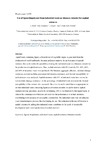Use of lignin biopolymer from industrial waste as bitumen extender for asphalt mixtures

Use this link to cite
http://hdl.handle.net/2183/27226Collections
- Investigación (ETSECCP) [826]
Metadata
Show full item recordTitle
Use of lignin biopolymer from industrial waste as bitumen extender for asphalt mixturesDate
2019Citation
Pérez, I. P., Pasandín, A. M. R., Pais, J. C., & Pereira, P. A. A. (2019). Use of lignin biopolymer from industrial waste as bitumen extender for asphalt mixtures. Journal of Cleaner Production, 220, 87-98.
Abstract
[Abstract:] Liquid waste containing lignin, a biopolymer of vegetable origin, is generated from the production of wood hardboards. Because polymers improve the performance of asphalt mixtures, this work studies the possibility of using this industrial waste as a bitumen extender in the production of asphalt mixtures. Thus, asphalt mixtures with 0% (control), 5%, 10%, 20%, and 40% of industrial waste were produced. The bitumen–aggregate adhesion, moisture damage resistance, resilient modulus, permanent deformation resistance, and thermal susceptibility of such mixtures were analysed. Asphalt mixtures with 20% of industrial waste showed the best moisture damage resistance. As the percentage of industrial waste increased, the thermal susceptibility of the mixture also increased. In this regard, at 5 °C, the resilient modulus of the mixture made with 20% of industrial waste was 19.08% lower than that of the control mixture. Moreover, at 30 °C, the resilient modulus of the mixture made with 20% of industrial waste was 10.48% higher than that of the control mixture. Therefore, it can be stated that it is appropriate to use this industrial waste containing lignin as a bitumen extender. It can be used in asphalt mixtures for road pavement, mainly by substituting 20% of the bitumen by this liquid waste. It reduces the consumption of bitumen and improves the performance of asphalt mixtures, contributing to the purpose of sustainable construction. The industrial waste was not subjected to any transformation process, thus facilitating its use. The reduction in the use of bitumen in asphalt mixtures by adding this industrial waste contributes to the goals of sustainable development and cleaner production of asphalt mixtures.
Keywords
Lignin
Biopolymer
Industrial waste
Asphalt mixture
Bitumen extender
Biopolymer
Industrial waste
Asphalt mixture
Bitumen extender
Editor version
Rights
Preprint do artigo de Elsevier: Pérez, I. P., Pasandín, A. M. R., Pais, J. C., & Pereira, P. A. A. (2019). Use of lignin biopolymer from industrial waste as bitumen extender for asphalt mixtures. Journal of Cleaner Production, 220, 87-98.





